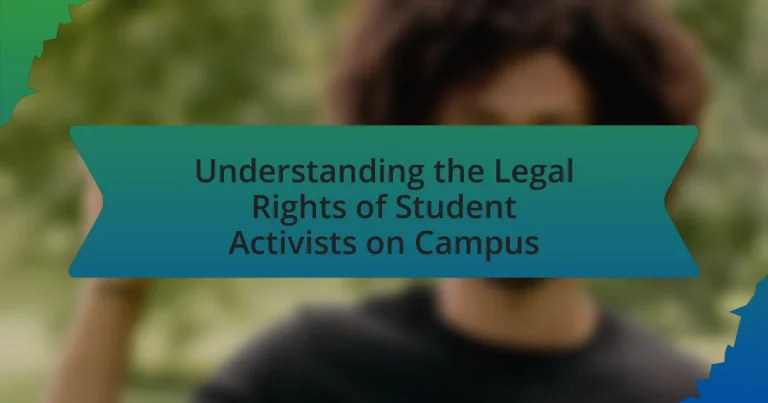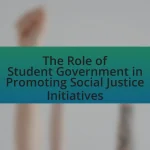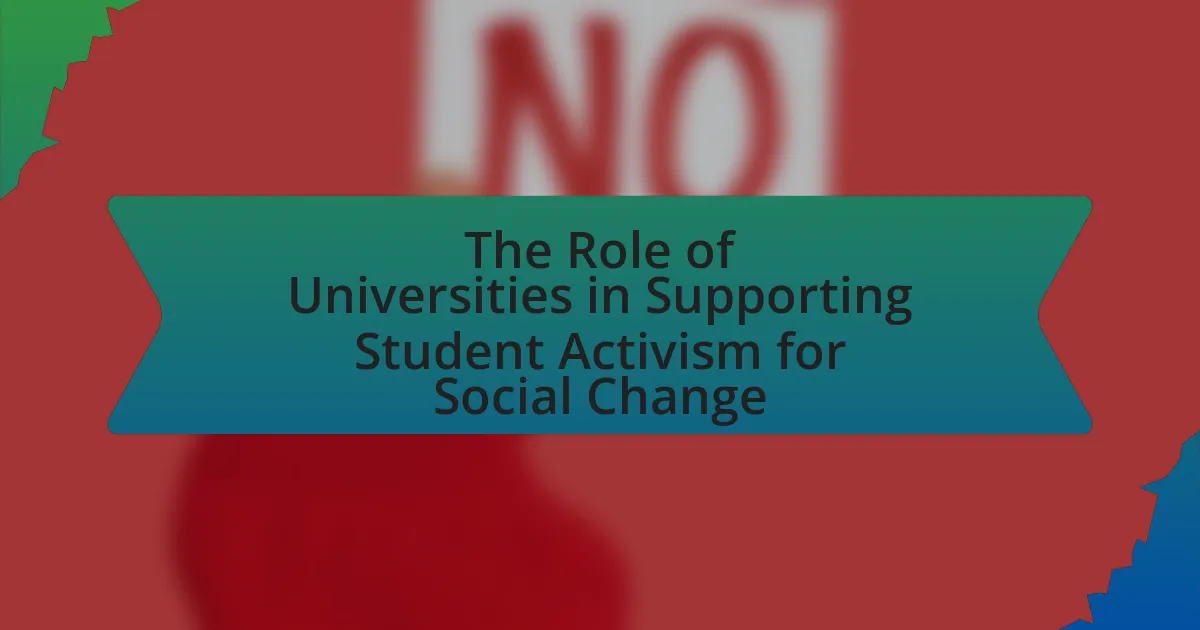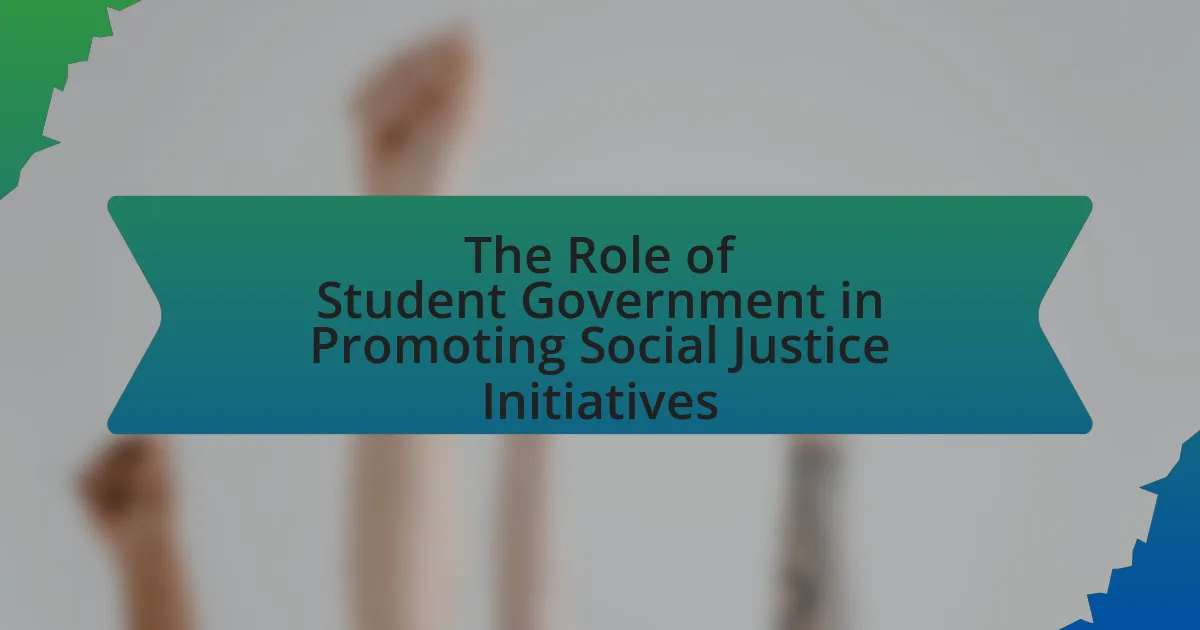The article focuses on the legal rights of student activists on campus, emphasizing the protections afforded by the First Amendment, Title IX, and other federal laws. It outlines how these rights can vary between public and private institutions, influenced by state laws and institutional policies. Key legal protections, common challenges faced by activists, and the importance of understanding these rights are discussed, along with strategies for navigating legal issues and advocating effectively. The article also highlights available resources for legal assistance and best practices for student activists to safeguard their rights.
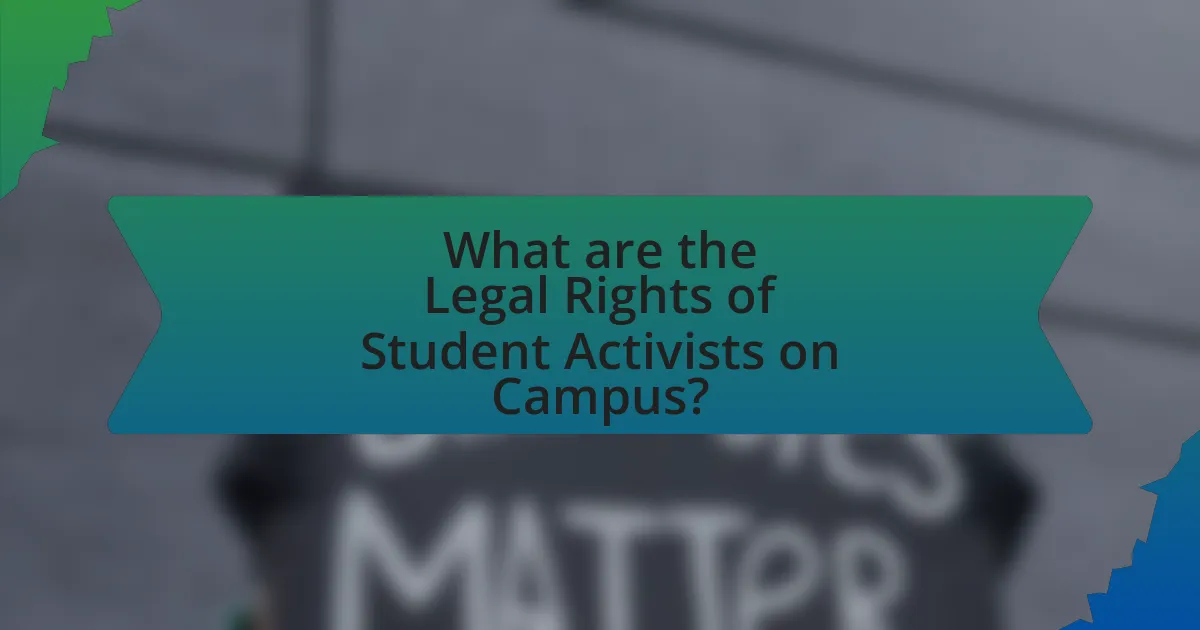
What are the Legal Rights of Student Activists on Campus?
Student activists on campus have the legal right to free speech, assembly, and expression under the First Amendment of the U.S. Constitution. This right allows them to organize protests, distribute literature, and engage in discussions without fear of censorship, as long as their activities do not disrupt the educational environment or violate university policies. Additionally, Title IX protects students from discrimination based on sex, which can include harassment related to activism. Courts have upheld these rights in various cases, affirming that public universities must respect students’ rights to express their views and advocate for change. For example, in the case of Tinker v. Des Moines Independent Community School District (1969), the Supreme Court ruled that students do not “shed their constitutional rights to freedom of speech or expression at the schoolhouse gate.”
How do these rights vary across different educational institutions?
Student activists’ rights vary significantly across different educational institutions due to factors such as institutional policies, state laws, and the nature of the institution (public vs. private). Public universities are generally bound by the First Amendment, which protects free speech and assembly, while private institutions may have more leeway to impose restrictions based on their own policies. For example, a study by the Foundation for Individual Rights in Education (FIRE) found that 37% of public colleges maintain policies that restrict student speech, whereas private colleges often have their own codes of conduct that can limit activism. Additionally, the interpretation of rights can differ based on the institution’s mission and values, leading to varied experiences for student activists across campuses.
What factors influence the legal rights of student activists?
The legal rights of student activists are influenced by several factors, including constitutional protections, institutional policies, and state laws. Constitutional protections, such as the First Amendment, guarantee freedom of speech and assembly, which are critical for student activism. Institutional policies, often outlined in student handbooks, can either support or restrict these rights based on the institution’s interpretation of safety and order. Additionally, state laws may vary significantly, impacting the extent of legal protections available to student activists. For example, some states have enacted laws that specifically protect student speech and activism, while others may impose restrictions that limit these rights.
How do state laws impact student activism rights?
State laws significantly impact student activism rights by establishing the legal framework within which students can express their opinions and engage in protests. For instance, laws regarding free speech, assembly, and the use of school facilities directly influence how and when students can organize and participate in activism. In many states, the First Amendment rights are upheld, allowing students to voice their concerns; however, some states impose restrictions that can limit these rights, such as requiring permits for demonstrations or prohibiting certain types of speech on school grounds. A notable example is the “Student Free Expression Law” enacted in several states, which protects students’ rights to express their views, provided they do not disrupt educational activities. This legal landscape varies widely, with some states offering robust protections for student activism while others impose significant limitations, thereby shaping the overall environment for student engagement in social and political issues.
Why is it important for student activists to understand their legal rights?
It is important for student activists to understand their legal rights to effectively advocate for their causes without facing legal repercussions. Knowledge of legal rights empowers student activists to navigate campus policies, engage in protests, and express their opinions while protecting themselves from potential violations of their rights, such as freedom of speech and assembly. For instance, the First Amendment of the U.S. Constitution guarantees these rights, and understanding them helps students avoid unlawful restrictions imposed by institutions. Additionally, awareness of legal protections can prevent intimidation or retaliation from authorities, ensuring that student voices are heard and respected in the democratic process.
What risks do student activists face without this understanding?
Student activists face significant risks without understanding their legal rights on campus, including potential violations of their freedom of speech and assembly. Without this knowledge, they may inadvertently engage in activities that lead to disciplinary actions from their institutions, such as suspension or expulsion. Additionally, they may lack the ability to effectively advocate for their rights, leaving them vulnerable to harassment or intimidation from both peers and authorities. Historical cases, such as the 1960s Free Speech Movement at the University of California, Berkeley, illustrate how a lack of legal awareness can lead to severe repercussions for student activists, including arrests and legal battles. Understanding legal rights empowers student activists to navigate campus policies and protect themselves against unjust treatment.
How can knowledge of legal rights empower student activists?
Knowledge of legal rights empowers student activists by providing them with the tools to advocate effectively and protect themselves from potential violations. When students understand their rights, such as freedom of speech, assembly, and the right to protest, they can engage in activism without fear of unjust repercussions. For instance, the First Amendment of the U.S. Constitution guarantees these rights, allowing students to express their views and organize events on campus. This legal framework supports their actions and enables them to challenge administrative decisions or policies that infringe upon their rights. Furthermore, awareness of legal protections can lead to increased confidence among student activists, fostering a more vibrant and engaged campus community.
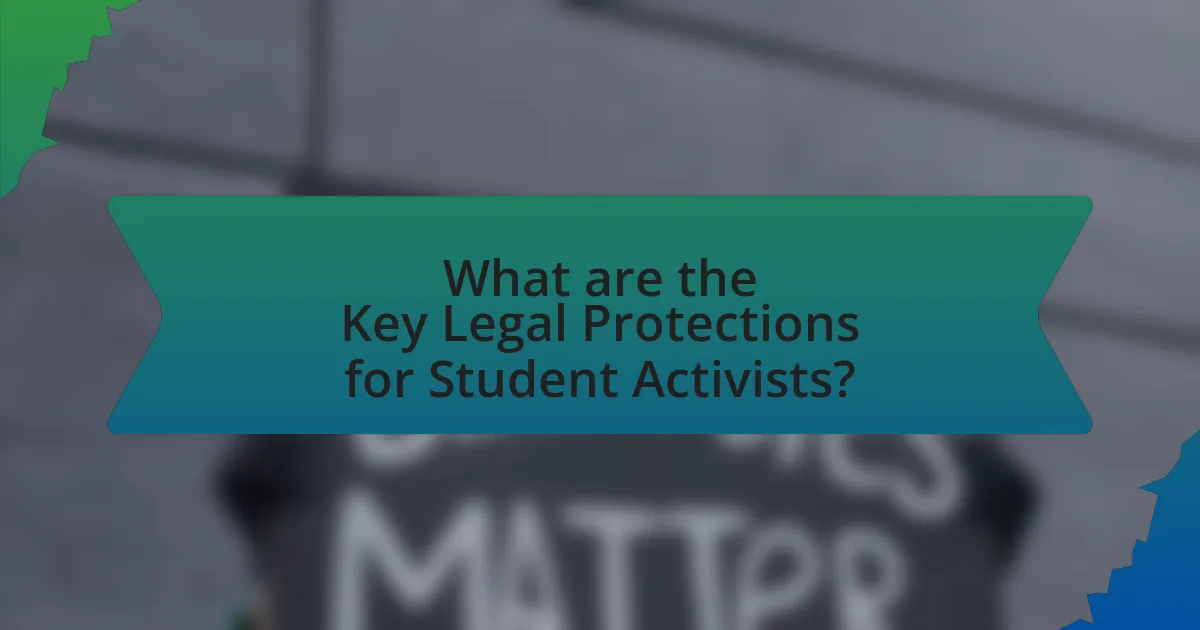
What are the Key Legal Protections for Student Activists?
Key legal protections for student activists include the First Amendment rights to free speech, assembly, and petition, which safeguard their ability to express opinions and organize on campus. These rights are reinforced by court rulings such as Tinker v. Des Moines Independent Community School District, which established that students do not “shed their constitutional rights to freedom of speech or expression at the schoolhouse gate.” Additionally, Title IX protects students from discrimination based on sex, which can include protections for activism related to gender equality. The Equal Access Act mandates that public secondary schools provide equal access to extracurricular clubs, ensuring that student activists can organize and meet without discrimination. These legal frameworks collectively support the rights of student activists to engage in political and social discourse on campus.
What constitutional rights protect student activists?
Student activists are primarily protected by the First Amendment rights, which include freedom of speech, freedom of assembly, and freedom of petition. These rights allow students to express their opinions, gather for protests, and advocate for change without fear of retaliation from school authorities. The Supreme Court case Tinker v. Des Moines Independent Community School District (1969) established that students do not “shed their constitutional rights to freedom of speech or expression at the schoolhouse gate,” affirming that student activism is a protected form of expression as long as it does not disrupt the educational process.
How does the First Amendment apply to student activism?
The First Amendment protects student activism by guaranteeing the rights to free speech, assembly, and petition. This constitutional protection allows students to express their opinions, organize protests, and advocate for social change without fear of censorship or retaliation from school authorities. Landmark cases, such as Tinker v. Des Moines Independent Community School District (1969), established that students do not “shed their constitutional rights to freedom of speech or expression at the schoolhouse gate,” affirming that student activism is a vital aspect of democratic engagement.
What role does the Fourteenth Amendment play in protecting student rights?
The Fourteenth Amendment plays a crucial role in protecting student rights by ensuring equal protection under the law and due process in educational settings. This amendment prohibits states from denying any person within their jurisdiction the equal protection of the laws, which has been interpreted by courts to apply to students in public schools and universities. For instance, in the landmark case of Brown v. Board of Education (1954), the Supreme Court ruled that racial segregation in public schools violated the Equal Protection Clause, thereby affirming that students have the right to an education free from discrimination. Additionally, the Due Process Clause of the Fourteenth Amendment requires that students be afforded fair procedures before being deprived of their rights, such as suspension or expulsion, as established in cases like Goss v. Lopez (1975). These legal precedents demonstrate the amendment’s vital role in safeguarding the rights of students within educational institutions.
What federal laws support student activism on campus?
Federal laws that support student activism on campus include the First Amendment, which guarantees freedom of speech and assembly, allowing students to express their views and organize protests. Additionally, Title IX prohibits discrimination based on sex, which can encompass activism related to gender equality and sexual harassment issues. The Equal Access Act mandates that public secondary schools provide equal access to extracurricular clubs, including those focused on political or social issues. These laws collectively empower students to engage in activism and protect their rights to organize and express dissent on campus.
How does Title IX influence student activism related to gender equality?
Title IX significantly influences student activism related to gender equality by providing a legal framework that prohibits sex-based discrimination in educational institutions. This federal law empowers students to advocate for their rights, as it mandates equal treatment and opportunities regardless of gender. For instance, Title IX has led to increased awareness and mobilization around issues such as sexual harassment and assault on campuses, prompting students to organize protests and campaigns for safer environments. The U.S. Department of Education reported that since the enactment of Title IX in 1972, there has been a notable increase in female participation in sports and academic programs, illustrating its impact on promoting gender equity. Thus, Title IX serves as both a catalyst and a shield for student activists striving for gender equality in educational settings.
What protections does the Clery Act provide for student activists?
The Clery Act provides protections for student activists by requiring institutions to disclose information about campus safety and security policies, including incidents of violence and harassment. This transparency helps student activists understand their rights and the risks they may face while engaging in activism. Additionally, the Clery Act mandates that schools implement policies to address sexual assault and other forms of violence, which can create a safer environment for student activism. The act’s requirement for timely warnings about threats to campus safety further supports student activists by ensuring they are informed about potential dangers that could impact their activities.
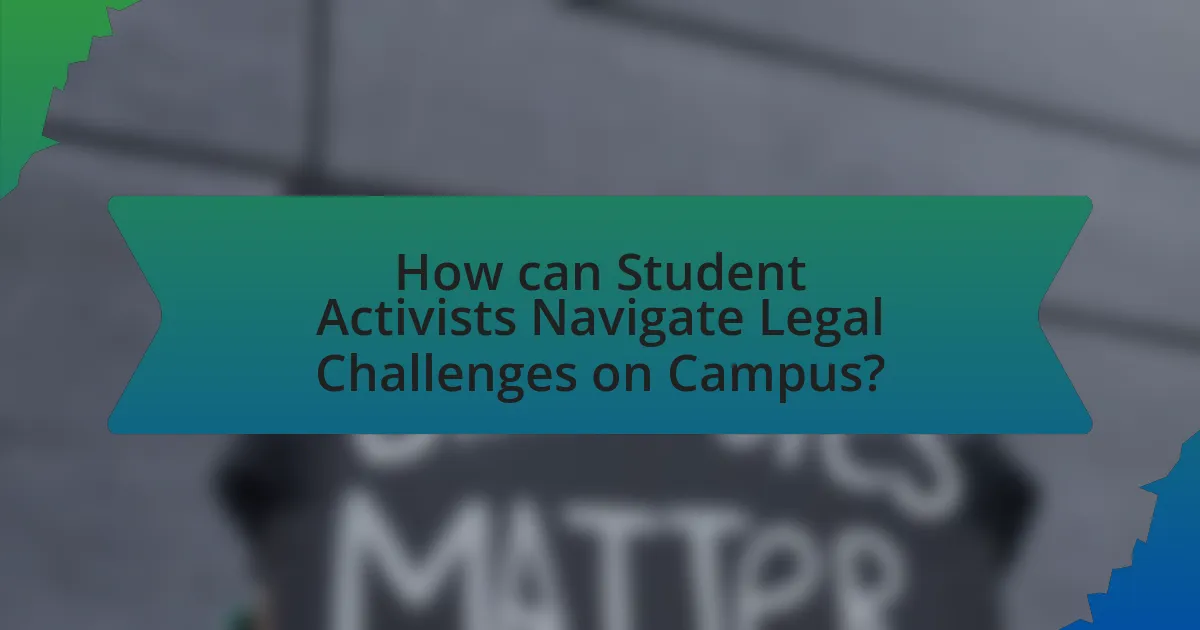
How can Student Activists Navigate Legal Challenges on Campus?
Student activists can navigate legal challenges on campus by understanding their rights, seeking legal counsel, and utilizing campus resources. Knowledge of First Amendment rights, which protect freedom of speech and assembly, is crucial for activists to engage in protests and demonstrations without fear of retaliation. Additionally, consulting with organizations like the American Civil Liberties Union (ACLU) can provide guidance on legal protections and strategies. Campus legal aid services often offer support and advice tailored to student needs, ensuring that activists are informed about university policies and local laws. Engaging in dialogue with university administration can also help clarify rights and responsibilities, fostering a more supportive environment for activism.
What common legal challenges do student activists face?
Student activists commonly face legal challenges such as restrictions on free speech, limitations on assembly, and disciplinary actions from educational institutions. These challenges often arise when student protests or demonstrations are perceived as disruptive, leading to potential violations of the First Amendment rights. For instance, universities may impose policies that limit the time, place, and manner of protests, which can infringe upon students’ rights to express their views. Additionally, student activists may encounter retaliation from school administrations, including suspension or expulsion, for their activism, which raises concerns about due process and equal protection under the law. Legal precedents, such as the Tinker v. Des Moines Independent Community School District case, affirm that students do not lose their constitutional rights at school, highlighting the ongoing tension between student activism and institutional regulations.
How can student activists prepare for potential disciplinary actions?
Student activists can prepare for potential disciplinary actions by understanding their rights and establishing a support network. Familiarizing themselves with school policies regarding protests and activism is crucial, as these documents outline the rules and potential consequences for violations. Additionally, maintaining clear documentation of events, including dates, times, and witnesses, can provide essential evidence if disciplinary actions arise. Engaging with legal resources, such as campus legal aid or civil rights organizations, can also offer guidance and representation if needed. These steps are supported by the fact that many universities have specific procedures for addressing student conduct, which can be found in their student handbooks or codes of conduct.
What steps should student activists take if their rights are violated?
Student activists should first document the violation of their rights by collecting evidence such as photographs, videos, and written accounts of the incident. This documentation serves as a crucial record that can support their claims. Next, they should report the violation to the appropriate authorities within their educational institution, such as the administration or the student affairs office, as many schools have specific procedures for addressing such issues. Following this, activists can seek legal advice from organizations that specialize in student rights, such as the American Civil Liberties Union (ACLU), which provides resources and support for students facing rights violations. Additionally, they should consider mobilizing support from fellow students and community members to raise awareness about the issue, as collective action can amplify their voices and pressure the institution to respond appropriately.
How can student activists effectively advocate for their rights?
Student activists can effectively advocate for their rights by organizing collective actions, utilizing social media platforms, and engaging in dialogue with administration. Collective actions, such as protests or sit-ins, have historically demonstrated their impact; for instance, the 1960s Civil Rights Movement showcased how unified efforts can lead to significant policy changes. Social media serves as a powerful tool for mobilization and awareness, allowing activists to reach a broader audience quickly, as evidenced by the #BlackLivesMatter movement, which gained global traction through online platforms. Additionally, engaging in constructive dialogue with school administration can lead to negotiations that address specific grievances, as seen in various universities where student-led committees have successfully influenced policy reforms.
What resources are available for student activists seeking legal assistance?
Student activists seeking legal assistance can access several resources, including the American Civil Liberties Union (ACLU), which provides legal support and guidance on civil rights issues. Additionally, the National Lawyers Guild offers legal resources and support specifically for activists. Campus-based legal aid clinics often provide free or low-cost legal services to students. Furthermore, organizations like the Student Press Law Center offer resources tailored to student journalists and activists facing legal challenges. These resources are crucial for ensuring that student activists understand their rights and receive the necessary legal support.
How can student organizations support activism and legal rights awareness?
Student organizations can support activism and legal rights awareness by hosting educational workshops and events that inform members about their rights and the legal frameworks surrounding activism. These organizations can collaborate with legal experts to provide accurate information on topics such as free speech, assembly rights, and anti-discrimination laws, which are crucial for student activists. For instance, the American Civil Liberties Union (ACLU) offers resources specifically tailored for students, highlighting their rights on campus. By disseminating this information through seminars, pamphlets, and online platforms, student organizations can empower their members to engage in activism while understanding the legal protections available to them.
What best practices should student activists follow to protect their rights?
Student activists should document all interactions with authorities to protect their rights. This includes recording conversations, saving emails, and taking notes during meetings, as documentation serves as evidence in case of disputes or violations. Additionally, they should familiarize themselves with their institution’s policies regarding free speech and assembly, as understanding these regulations helps them navigate their rights effectively. Engaging with legal organizations that specialize in student rights, such as the Foundation for Individual Rights in Education (FIRE), can provide valuable resources and support. Furthermore, forming coalitions with other student groups enhances collective bargaining power and visibility, which can deter potential infringements on rights.
